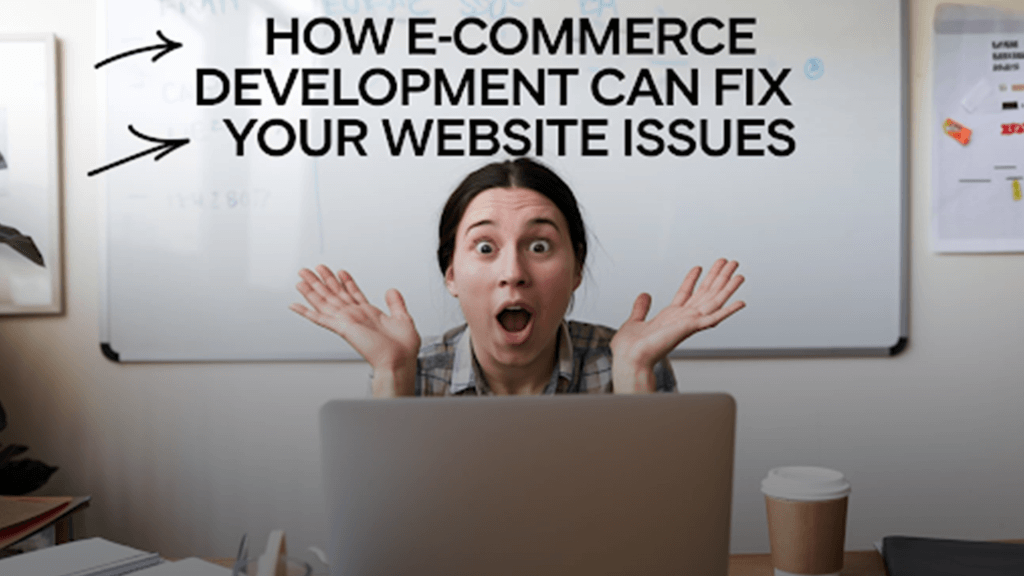For many businesses, selling online can seem very difficult. Old designs, slow websites, and bad customer experiences make potential buyers leave. In fact, 61% of shoppers stop using websites that are hard to navigate, according to Statista.
But the great thing is that these obstacles become opportunities. Using a wise approach to developing your eCommerce, you will ensure it is user-friendly and that it is actually going to work as a cash-printing machine. You should know that the correct adjustment and improvement in the designs could make your business really soar online.
This is a blog on everything you need to know about eCommerce development. It has discussed the benefits, features, industry insights, and some useful tips that help build a website, attract customers and help your brand grow.
What Is Ecommerce Development?
Ecommerce Development refers to making an an online place for a business to sell their products or services on the internet, where user-friendly designs should be created and features must be added while managing the data and connecting tools, thus providing an easy way to shop.
Developing an eCommerce website is more than listing products online. It involves:
- Navigation and user interface improvement.
- Connecting safe payment systems.
- Ensuring the platform works smoothly across devices.
Why Is Ecommerce Development Important?
E-commerce development is the backbone of business operations for companies who want to stay ahead in the digital world, providing both growth and long-term success. A well-built platform with strong FrontEnd development allows businesses to expand their global reach and provide 24/7 access.
- It increases the accessibility of customers. Businesses can access a global audience.
- Streamlined operations, from inventory management to order tracking, increase efficiency.
- CMS development enables businesses to effectively manage their content and reach customers.
- Web portal development helps build long-term customer loyalty with personalized experiences and features.
- Regular website maintenance helps it work well and keeps it lasting longer.
Benefits of Ecommerce Development
When implemented properly, eCommerce web solutions can offer several benefits to improve both business operations and the customer’s experience.
Let’s focus on some of these major advantages:
Global Reach
An eCommerce platform removes geographical barriers, thereby giving businesses access to a global market. Reaching new markets allows businesses to scale effectively and explore revenue streams not tapped.
Cost-Efficiency
Unlike physical stores with overhead costs such as rent, utilities, and staffing, eCommerce websites significantly cut down on operational costs. Automation of sales, payments, and inventory also contributes to further cost-cutting.
Enhanced User Convenience
Customers value the simplicity of online shopping. With features like personalized recommendations, easy search options, and multiple payment methods, an optimized eCommerce site ensures users have a hassle-free experience.
24/7 Accessibility
Your online store never sleeps. Because it’s always accessible, a business can serve customers all around the world, making revenue all day and night.
Data-Driven Insights
Integrated analytics enables eCommerce platforms to enable businesses to collect customer behavior data, track sales patterns, and refine marketing strategies. The outcome is always a data-driven decision, enhancing growth.
Highly Customizable Experiences
Ecommerce platforms allow businesses to personalize the shopping experience. Features, for example, custom product recommendations and localized content build customer relationships.
Scalability During Demand Spikes
With flexible resources, eCommerce platforms adapt to varying demands in peak seasons or with product launches without sacrificing their performance.
Advanced Marketing Opportunities
From email campaigns to retargeting ads, an eCommerce website integrates advanced tools to help businesses market smarter and improve ROI.
Security and Trust-Building
Modern eCommerce development integrates secure payment gateways and robust data protection measures, building trust with your customers and ensuring safe transactions.
Diversified Revenue Streams
Beyond selling products, eCommerce platforms enable new income opportunities such as subscription services, bundled offers, or upsell tactics.
Also Read: What Web Development Can Do for Your Business Growth
Features of an Effective Ecommerce Website
A good eCommerce platform has to offer an intuitive and fun shopping experience.
Here are the key features that every top-of-the-line ecommerce website design and development company focuses on:
Responsive Design
Ensure your website adapts flawlessly to every screen size—from desktops to smartwatches. Modern buyers use multiple devices to shop, and a seamless experience on all platforms improves user satisfaction.
Secure Payment Integration
Integrating not just common gateways like PayPal and Stripe but also region-specific payment methods like Klarna or Alipay can expand market reach while building customer trust. Incorporating biometric authentication can add another layer of security.
Advanced Search Options
AI-driven search features like auto-suggestions, voice search, or visual search (allowing users to search using images) provide futuristic solutions that go beyond basic filtering, leading to higher customer retention.
Streamlined Checkout
A one-click checkout feature, used by giants like Amazon, simplifies the process further. Allowing guest checkouts can accommodate users who don’t wish to create an account, reducing barriers to purchase.
Fast Loading Times
Advanced techniques like image optimization, lazy loading (loading images only as users scroll), and the use of Content Delivery Networks (CDN) ensure your site operates efficiently, even during high-traffic periods.
Detailed Product Pages
Beyond high-resolution images and clear descriptions, use augmented reality (AR) tools to let users view products in their environment—for instance, seeing furniture in their living room. Video demonstrations can also improve buyer confidence.
Personalized Recommendations
AI-powered recommendation engines analyze user behavior to display products tailored to individual preferences, creating a curated shopping experience.
Wishlist and Save-For-Later Features
A “Save for Later” option encourages repeat visits. Combined with automated email reminders about these saved items, this can lead to increased conversions.
Multi-Language and Multi-Currency Support
Reaching a global audience requires multi-language options and dynamic currency conversion to ensure an inclusive shopping experience for customers worldwide.
Subscription Models
Offering subscription options for consumables, such as pet food or skincare products, boosts recurring revenue.
Social Proof Integrations
Features like user-generated content (photos or videos from customers) and real-time reviews give buyers the confidence to complete their purchases.
Sustainability Metrics
Add “eco-score” or sustainability tags to product listings, showcasing environmental impact. This resonates with the growing base of eco-conscious shoppers.
Industries That Benefit from Ecommerce Development
Ecommerce development isn’t just limited to retail. Various industries are leveraging eCommerce platforms to grow their businesses.
Here are a few examples:
Retail and Fashion
From clothing brands to department stores, retailers now use eCommerce to showcase products and expand their reach.
Food and Beverage
Online ordering systems allow restaurants and food businesses to offer delivery services with ease.
Health and Wellness
Fitness equipment, supplements, and virtual coaching are now sold through advanced eCommerce platforms.
Education
Institutions sell online courses, e-books, and certifications, providing students with easy access to materials.
Process of Ecommerce Development
Developing an eCommerce website requires following a systematic approach to achieve the best results.
Below is the process most ecommerce website development services follow:
Initial Research and Planning
This is the first step in making sense of the target audience, analyzing your competitors, and determining unique features for your website. It’s about gathering insight that guides every decision that will come through the process of developing your website.
UI/UX Design
A visually appealing design isn’t just for show—it’s about providing an intuitive, user-friendly experience that keeps visitors engaged. The right layout, clear navigation, and well-thought-out visual elements make a strong first impression and encourage users to explore further.
Backend Development
The backend is like the engine of the website. It’s where the code, databases, and functionality live. Having solid backend development ensures everything runs smoothly behind the scenes, which is essential for a great user experience.
Frontend Integration
The frontend is the part visitors interact with. It takes all the backend work and presents it in a way that’s visually appealing and easy to use. This step connects the website’s look and feel to all the behind-the-scenes technical details.
Testing and Quality Assurance
Before going live, testing is essential to ensure everything is in place and working as intended. From checking how fast the site loads to whether it’s safe and responsive on all devices, testing is the most important step in delivering a seamless experience for users.
Launch and Post-Launch Support
Once the website is established, it calls for periodic updates, fixing, and adjustments to continue running in good order. This ongoing support ensures that your website will remain safe and run smoothly as your business evolves.
Benefits of Hiring Ecommerce Website Developers
Partnering with professional ecommerce site developers can make all the difference in achieving success. Their expertise ensures:
- Tailored solutions based on your industry.
- Efficient integrations for payment, CRM, and inventory.
- Scalable designs to accommodate future growth.
- Ongoing support for resolving issues.
Analyzing Website Maintenance in Ecommerce Development
Website maintenance is important in sustaining the performance of an ecommerce platform. It includes:
- Performance Monitoring: Identify and address slowdowns.
- Security Updates: Prevent data breaches and cyberattacks.
- Regular Updates: Keep your product catalog fresh.
Consistent maintenance ensures your website stays relevant and user-friendly.
Tools and Technologies for Ecommerce Development
Here are essential tools and platforms used by ecommerce web development services:
- CMS Platforms: WordPress, Shopify, Magento.
- Database Systems: MySQL, PostgreSQL.
- Payment Gateways: PayPal, Stripe.
- Marketing Tools: MailChimp, Google Analytics.
- Frameworks: Angular, React, Laravel.
You May Also Like: The Pros and Cons of 10 Popular CMS Development Platforms
Comparing Custom vs. Pre-Built Ecommerce Solutions
| Aspect | Custom Solutions | Pre-Built Solutions |
| Cost | Higher upfront cost | More affordable |
| Flexibility | Fully customizable | Limited features |
| Launch Time | Longer development time | Quicker implementation |
| Scalability | Easily scalable | May require upgrades |
Custom solutions, while expensive, offer a long-term advantage in terms of personalization and scalability.
Case Study: Success with Ecommerce Website Development
Let’s take a real example of a small retail business transitioning to an online platform:
Case: Urban Trend Fashion
Challenges
- Limited local customer base.
- Inadequate resources for traditional expansion.
Solutions
Partnered with an ecommerce website design and development services provider to create a responsive site with multi-currency and language options.
Results
- Increased revenue by 45% within the first six months.
- Reduced operational costs by 30%.
- Expanded to international markets.
Choosing the Right Ecommerce Website Development Company
If you’re considering hiring an ecommerce website development company in USA or globally, follow these tips:
- Check their portfolio for relevant industry experience.
- Read client reviews and testimonials.
- Assess their expertise in key platforms (Shopify, Magento, etc.).
- Ensure they provide post-launch support.
Conclusion
Today, ecommerce development cannot wait for a business wanting the long run. This aspect has limitless benefits in increased customer reach to streamlined operations in today’s competitive online landscapes. By partnering with the right e-commerce website development company, it is not just about getting one step ahead of competitors; it is also about having a platform that your customers might love.
We’ve helped countless businesses create ecommerce sites that leave a lasting impression.
Don’t let your vision go unnoticed, contact us today, and let’s make something truly unforgettable.

